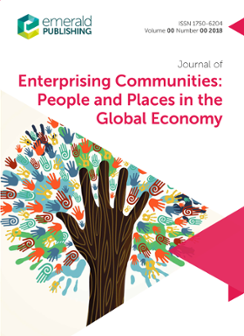Journal of Enterprising Communities: People and Places in the Global Economy: Volume 17 Issue 2
Table of contents
Entrepreneurship education in Post-Soviet states developing programmes for hospitality and tourism students in Samarkand
Leei John, Marc Robertson, Kate Tetley, Claire SeamanThis paper considers a country context where traditional entrepreneurship has not been a major part of the economy and considers current attempts to develop entrepreneurship…
Community and public-private partnership projects in Uganda: community engagement, trust and performance
Isaac Wanzige Magoola, Rogers Mwesigwa, Ruth NabwamiThe purpose of this paper is to provide the initial evidence of the relationship between the community and public-private partnership (PPP) projects by focusing on community…
Positionality of refugee business support and hospitality building under cognitive dissonance theory: an enterprising route of refugee entrepreneurship
Shuai QinFor the developed economies in Europe, to which refugees move, and as refugees’ enterprising expectations evolve, emerging cognitive factors have become closely intertwined with…
Intention of coastal communities to support climate change mitigation policies for fish and marine ecosystem preservation
Antonino Galati, Antonio Tulone, Demetris Vrontis, Alkis Thrassou, Maria CrescimannoThis paper aims to assess the willingness of individuals living in coastal communities affected by climate change to financially support mitigation policies towards the…
Strategic guidelines for community enterprise development: a case in rural Thailand
Harry Jay M. Cavite, Chanhathai Kerdsriserm, Suneeporn SuwanmaneepongIn spite of the government’s support for small-scale rice farmers in rural areas of Thailand, several problems still affect their production and marketing performance. This study…
How do social responsibility and social entrepreneurship generate value creation in pandemics?
Rui Silva, Margarida Rodrigues, Mário Franco, Cidália Oliveira, Nuno SousaUsing self-determination theory and individual social responsibility’s (ISRs) association with pure social entrepreneurship, this study aims to answer the following question: How…
The effects of COVID-19 on small and medium-sized enterprises: empirical evidence from Jordan
Tala Abuhussein, Husam Barham, Saheer Al-JaghoubThe ongoing coronavirus disease (COVID-19) pandemic has resulted in sudden changes in the macro environment and market behaviour, making most enterprises urgently reconfigure…
Exploring the perspectives of physically challenged women entrepreneurs in the Sekondi-Takoradi Metropolis, Ghana
Shaibu Bukari, Michael Ayikwei Quarshie, Felix Kwame OpokuEntrepreneurship and disability are discordant because of the assumption that the former is only meant for non-disabled people. Drawing on the capability, agency/structure and…
Changing times and women on the wheels: a qualitative investigation of the experiences of female commercial drivers in Lagos State, Nigeria
Temitope Owolabi, Tunde A. Alabi, Sofiat A. Busari-AkinbodeThis study aims to investigate female commercial drivers in the Lagos metropolis. The study sought to know the circumstances that motivated women to venture into commercial…
The business model canvas of women owned micro enterprises in the urban informal sector
Sujata MukherjeeThe purpose of this paper is to examine the motives and the business model canvas adopted by urban poor women to set up microenterprises in the informal sector.
Understanding the ease of doing agribusiness in emerging Asian economies: evidence from world enterprises survey
Waseem Khan, Trilok Pratap Singh, Mohammed JamshedThe purpose of this paper is to analyze the characteristics of agribusiness firms in India, China and Pakistan, as well as the challenges they face in doing business.
Entrepreneurial behavior of family firms in the Indian community: adoption of a technology platform as a moderator
Sheshadri Chatterjee, Ranjan Chaudhuri, Demetris VrontisThis study aims to investigate the generalizability of Daniela Weismeier-Sammer’s (2011) replication study on entrepreneurial behavior and extended the model by considering the…
Digitalization and rural entrepreneurial attitude in Indonesia: a capability approach
Fikri Zul Fahmi, Medina SaviraThis paper aims to identify how digitalization affects entrepreneurial attitudes in rural areas in Indonesia, a country in the Global South. The development of digital technology…
Iranian communities e-business challenges and value proposition design
Amir Emami, Elahe Farshad Bakhshayesh, Gadaf RexhepiThis paper aims to identify and examine the internal and external factors that e-business communities in Iran grapple with within value proposition design.
Strengthening business incubation practices among startup firms. Evidence from Ugandan communities
Bob Ssekiziyivu, Rogers Mwesigwa, Eunice Kabahinda, Sharon Lakareber, Florence NakajubiThe purpose of this paper is to provide the initial evidence on the role of business incubation (BI) in supporting startups and BI practices from developing communities in Uganda.
Education and enterprising profile of young community: evidence from a transition country
Vjollca Hasani, Jusuf Zeqiri, Kumrije Gagica, Kimberly Gleason, Sadudin IbraimiThis paper, in light of the theory of planned behavior, aims to analyze the factors that have an impact on entrepreneurial intentions among students in Kosovo.
“Community and health-care service quality in Kosovo”: “a confirmatory analytical approach”
Myesere Avdyl HoxhaThe purpose of this paper is to develop and test a modified service quality (SERVQUAL) model scale for measuring healthcare service quality in Kosovo.

ISSN:
1750-6204Online date, start – end:
2007Copyright Holder:
Emerald Publishing LimitedOpen Access:
hybridEditors:
- Prof Leo Dana
- Andrea Caputo